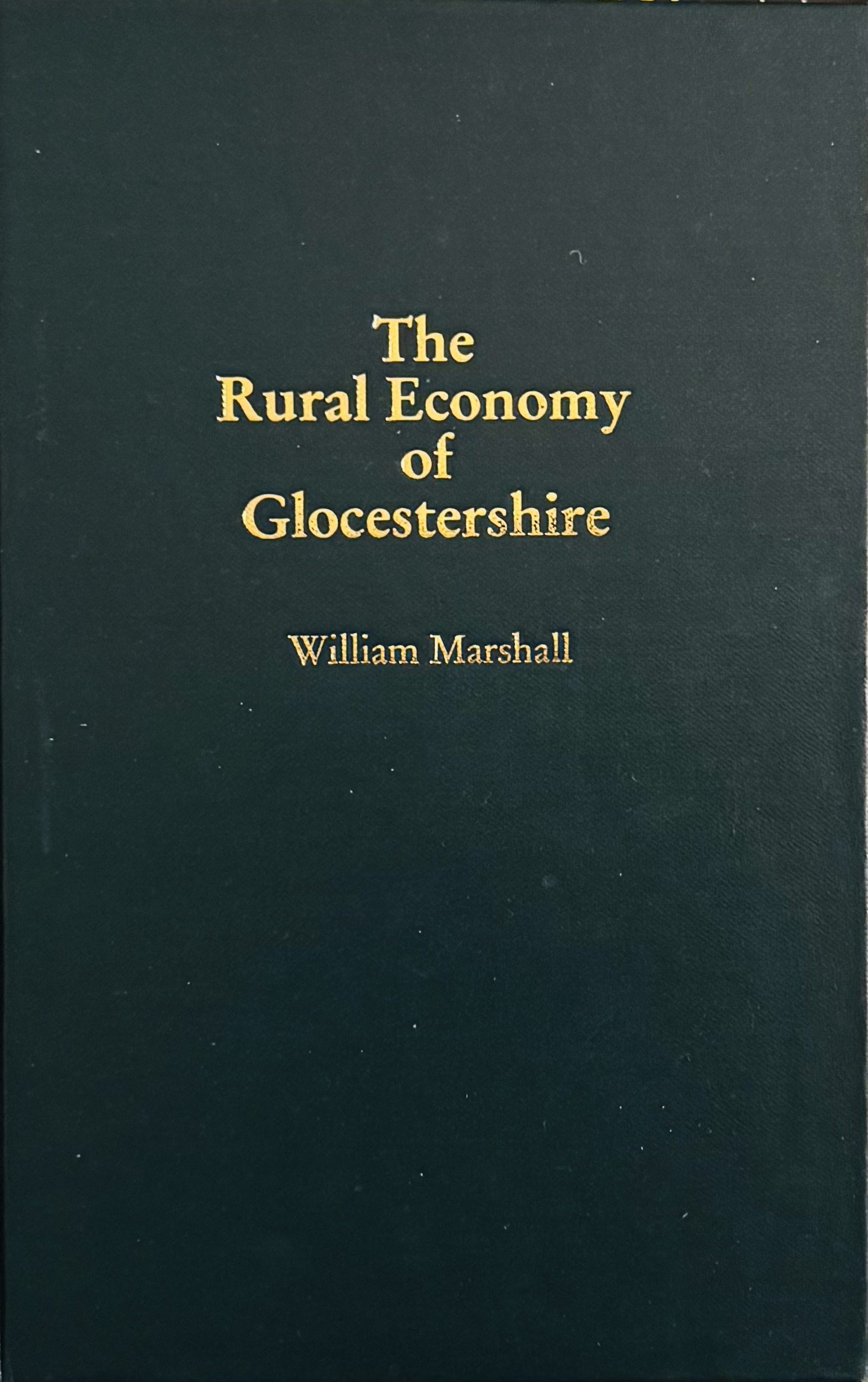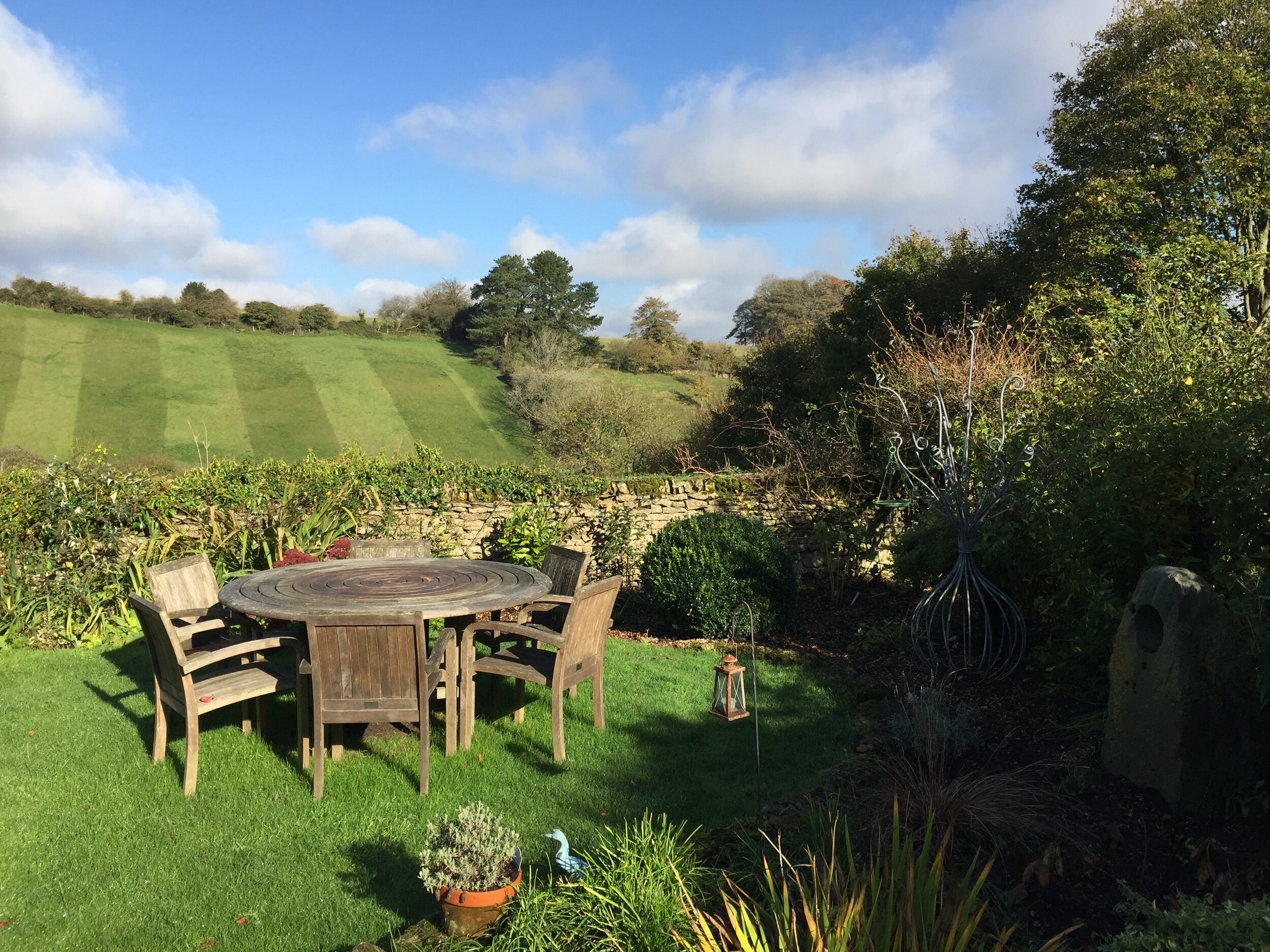Rural Economy of Glostershire by William Marshall ~ An Introduction (2025)

Gloucestershire
The Rural Economy of Glostershire
by
William Marshall
18th Century in the 29th Year
of the Reign of King George III
1760~1811
In the mind’s eye ~ a depiction, perhaps, of William Marshall as he undertakes his Examination of the Rural Economy of Gloucestershire in 1789. One imagines the surveyor walking with a colleague along Bushcombe Lane on Nottingham Hill just above Winchcomb in the North Cotswolds.
WILLIAM MARSHALL
During the reign of George III
An Introduction
William Marshall was a surveyor of land whose work, emanating from his practice in the county of Surrey, undertook a series of very detailed surveys on horseback during the latter part of the 18th century. His published works include:
The Rural Economy of Norfolk
The Rural Economy of Yorkshire
The Rural Economy of Glostershire
The law economy of the Midland Counties
The Rural Economy of the West of England
The Rural Economy of the Southern Counties
For me, this is my first detailed study of the Agricultural Revolution of the 17th and 18th centuries. Then followed the Industrial Revolution of the 19th and 20th centuries.
I
First published in 1796, I have Volume One entitled The Rural Economy of Glostershire, a facsimile edition published by Alan Sutton Publishing Limited of 17a Brunswick Road Gloucester GL1 1HG in 1979, 190 years later.
The book before me is antiquarian, a Limited Edition of 200 Sets. The two volumes are facsimile reprints of the 1796 edition. My copy of Volume One is Set No. 40.
The facsimile is printed in Great Britain by Redwood Burn of Trowbridge and Esher.
Born in Cheltenham, Gloucestershire, following fourteen very important years 2003-2017 in Liverpool. Having qualified in Cheltenham, I practised law in the City of Gloucester a stone’s throw away from Brunswick Road.
I emphasise that the author’s name, William Marshall, does not mean that there is any ancestral link. None at all. I only include this note because this also forms part of Windsor Street Days (Second Edition) 2025.
The agricultural revolution is especially important for me to begin to understand because when I study ancestral records, I find that in Southern Britain my ancestors worked on the land. Then, with the Industrial Revolution in the 19th century, the Marshall branch of the family moved into the skilled towns trades and became master bricklayers, and then progressing to steam locomotives. In the 1920s, my grandfather Frank Ewart Marshall was a fireman on the footplate of the famous Cheltenham Flyer, and his name appears on the Commemoration Plaque that now stands on the site of what used to be the Swindon Rail Network in Wiltshire.
II
In the First Edition of Windsor Street Days, I have drawn upon William Marshall‘s work when I discovered that my great-great-great-grandfather was in charge of cattle. But I never studied in detail the volume that is now before me, until now. I am thus delighted to have this, as it opens up whole new areas of family life over many hundreds of years.
William Marshall gives a beautiful description of Gloucestershire and I would like to think that somehow, this gentleman’s spirit might be aware that his work written in the 18th century, is being read and enjoyed in the 21st century, and also bringing great delight and enlightenment to a Glostershire man born and bred.
EXTRACT by William Marshall
Pages 5 ~ 6
(British English 18th Century)
Grammarly has been disengaged to protect the original style of writing
and to accurately report William Marshall’s style and method of writing in 1789.
Glostershire might well be styled the seat of picturesque beauty. It is equally a subjective study for the painter and rural artist; not in the outline only, but in the detail: the Stroudwater hills, and the banks of the Wye, are full of secluded beauty.
It is this lower extremity of the Southern Vale which falls within the district I have chosen for my present STATION. Not an account of its beauty; but by reason of its situation, with respect to the other stations I have fixed in; its richness; and the various productions it affords. Had it not been singularly characterized by natural ornament, I should not have detained the reader a moment on so unprofitable a subject. But the eye must be dim and the heart be numbed, which can be insensible to the rural beauty of Glostershire.
Author Note
The Gloucestershire Constabulary’s archival records report that to remove the problem for visitors Gloucestershire would be shortened from four to three syllables as visitors did not always realise that the letters U C E are silent. It is, however, important to note that William Marshall presented his treatise a century and a half before.
22 December 2024
All Rights Reserved
LIVERPOOL
© 2025 Kenneth Thomas Webb
Digital Artwork is by KTW IBM unless otherwise credited.
The photograph of the Cheltenham Flyer is taken from the Internet and I have not been able to find its source. Therefore, should anyone know where I might find this source, I will of course immediately apply the photographer’s / owner’s accreditation.
The reign of King George III of the House of Hannover was, until that time, one of the longest reigns ~ 51 years ~ in British History. The reign of Elizabeth I (1158~1603) was 45 years, the reign of Queen Victoria Empress of India (1837-1901) was 64 years and of course, the longest reigning Monarch in British history is Her Late Majesty Queen Elizabeth II of the House of Windsor
(1952-2022) 70 years.
Ken Webb is a writer and proofreader. His website, kennwebb.com, showcases his work as a writer, blogger and podcaster, resting on his successive careers as a police officer, progressing to a junior lawyer in succession and trusts as a Fellow of the Institute of Legal Executives, a retired officer with the Royal Air Force Volunteer Reserve, and latterly, for three years, the owner and editor of two lifestyle magazines in Liverpool.
He also just handed over a successful two year chairmanship in Gloucestershire with Cheltenham Regency Probus.
Pandemic aside, he spends his time equally between his city, Liverpool, and the county of his birth, Gloucestershire.
In this fast-paced present age, proof-reading is essential. And this skill also occasionally leads to copy-editing writers’ manuscripts for submission to publishers and also student and post graduate dissertations.








